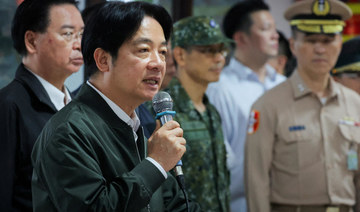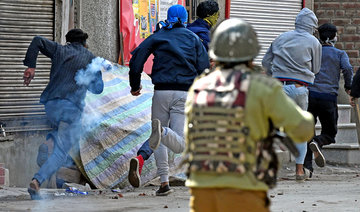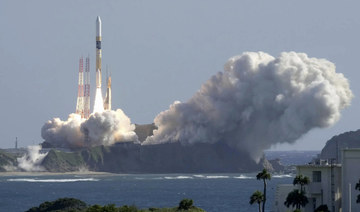BEIJING: China has urged Taiwanese to visit the mainland “without the slightest worry,” condemning the island authorities’ decision to raise their travel alert level after Beijing threats targeting independence advocates.
Last week, Beijing published judicial guidelines on criminal punishments for supporters of Taiwanese independence, including the death penalty for “particularly serious” cases involving “diehard” advocates.
In response, Taiwan’s government on Thursday urged the public to avoid “unnecessary travel” to mainland China and Hong Kong.
It also raised its travel warning for China to the second-highest “orange” level.
But Zhu Fenglian, a spokeswoman for a Chinese body in charge of Taiwan affairs, said in a statement late Friday that the new judicial directives “are aimed solely at the very small number of supporters of ‘Taiwan independence’, who are engaged in malicious acts and utterances.”
“The vast majority of Taiwan compatriots involved in cross-strait exchanges and cooperation do not need to have the slightest worry when they come to or leave mainland China,” she said.
“They can arrive in high spirits and leave fully satisfied with their stay,” she added.
Mainland China and Taiwan split following the Chinese civil war that ended in 1949.
Since then, China has claimed the democratic island as part of its territory. It says it wants “peaceful reunification” but has refused to rule out using force to bring it under its control.
Beijing has not conducted top-level communications with Taipei since 2016, when the Democratic Progressive Party (DPP)’s Tsai Ing-wen became the island’s leader. It has branded her successor, President Lai Ching-te, a “dangerous separatist.”
“The DPP authorities have fabricated excuses to deceive the people on the island” and “incite confrontation and opposition,” Zhu said in her statement.
Many Taiwanese travel to mainland China to work, study or do business.
China urges Taiwanese to visit ‘without worry’ despite threats
https://arab.news/2586d
China urges Taiwanese to visit ‘without worry’ despite threats

- Beijing earlier published judicial guidelines on criminal punishments for supporters of Taiwanese independence
- Many Taiwanese travel to mainland China to work, study or do business
Taliban to press international community on Afghanistan sanctions

- The two-day meeting began on Sunday and is the third such summit to be held in Qatar in a little over a year, but the first to include the Taliban authorities who seized power in Afghanistan in 2021
The two-day meeting began on Sunday and is the third such summit to be held in Qatar in a little over a year, but the first to include the Taliban authorities who seized power in Afghanistan in 2021.
Writing on X, formerly Twitter, senior foreign ministry official Zakir Jalaly said the Taliban government delegation would use Monday’s meetings to address “financial and banking sanctions” and the “challenges” these pose to Afghanistan’s economy.
His statement followed an opening salvo late Sunday by the head of the Taliban delegation, spokesman Zabihullah Mujahid, as he addressed more than 20 envoys and UN officials.
“Afghans are asking why they are being ganged up on, on the basis of unilateral and multilateral sanctions,” Mujahid said as he questioned whether ongoing sanctions were “fair practice” after “wars and insecurity for almost half a century as a result of foreign invasions and interference.”
The talks are being held to discuss increasing engagement with the impoverished country of more than 40 million and a more coordinated response, including economic issues and counter-narcotics efforts.
In the aftermath of the Taliban’s return to power, the international community has wrestled with its approach to Afghanistan’s new rulers.
The Taliban government in Kabul has not been officially recognized by any other government since it took power.
It has imposed a strict interpretation of Islam, with women subjected to laws characterised by the UN as “gender apartheid.”
The inclusion of a Taliban delegation but the exclusion of civil society and women’s rights groups sparked outrage, with organizations accusing the UN and attendees of legitimising Taliban government policies.
“Caving into the Taliban’s conditions to secure their participation in the talks would risk legitimising their gender-based institutionalized system of oppression,” Amnesty International chief Agnes Callamard said in a statement ahead of the talks.
The Taliban authorities have repeatedly said the rights of all citizens are guaranteed under Islamic law.
Mujahid said diplomats should “find ways of interaction and understanding rather than confrontation,” despite “natural” differences in policy.
“The Islamic Emirate of Afghanistan is keen on engaging constructively with Western nations as well,” Mujahid said.
“Like any sovereign state, we uphold certain religious and cultural values and public aspirations that must be acknowledged.”
India overhauls colonial-era laws with new criminal codes

- The three overhauled laws were passed last year during India’s previous parliament
- First person charged under the new codes was a street vendor blocking a footbridge in New Delhi
NEW DELHI: India on Monday implemented an overhaul of colonial-era criminal laws, praised as a “watershed” movement by the top judge but which critics said could worsen an already glacially slow pace of justice.
Amit Shah, the interior minister, said the codes would help India “become the world’s most modern justice delivery system.”
The three overhauled laws — the penal code, and codes relating to criminal procedure and evidence — were passed last year during India’s previous parliament, but only came into effect on Monday.
Chief Justice D. Y. Chandrachud said they “signify a watershed moment for our society.”
Laws dealing with sexual assault have been strengthened, while a previous law criminalizing sodomy has been removed.
Key changes include the amount of time police can hold a suspect rising from 15 days to 60, and, in some special cases, up to 90.
Previously it was up to a judge to decide if a case could proceed to trial, but the new laws bolster the power of the police to decide, something Supreme Court lawyer Nipun Saxena criticized.
“Judicial functions cannot be transferred to police,” Saxena said.
The code has also been modernized — requiring video recordings to be made at the scene of serious crimes, as well as updating admissible digital evidence.
But critics say the new laws could create confusion, as they will run parallel to those on trial charged under the previous system.
India already has a notoriously slow justice system, with millions of cases pending in the courts at any time.
Saxena warned the changes could increase the number of cases awaiting trial by “30-40 percent.”
Opposition parties said the laws were passed when more than 100 lawmakers were suspended from the house, meaning key issues were not debated.
“Many crucial safeguards have been omitted completely,” Saxena said, adding the new laws violate “at least four articles of the constitution and many important judgments of the Supreme Court.”
He said these relate to procedural safeguards, protection against illegal detention, and laws against self-incrimination.
At independence in 1947, India inherited the 19th-century penal code imposed by British rule, although it has been overhauled by previous parliaments.
“The claim that the changes decolonialize the criminal procedure code is spurious,” Saxena said.
The first person charged under the new codes was a street vendor blocking a footbridge in the capital New Delhi, the Times of India reported.
Athletes who are ‘human rights defenders’ need protection, says UN

- “When athletes use their voice to promote equality in sport, they are human rights defenders,” said Volker Turk, the UN High Commissioner for Human Rights
GENEVA: Athletes who speak out for equality or denounce abuses in their sport often do so at great personal risk and must be given the same protection as all other defenders of human rights, the UN human rights chief said on Monday.
“When athletes use their voice to promote equality in sport, they are human rights defenders,” said Volker Turk, the UN High Commissioner for Human Rights.
“They often speak out at great risk to themselves and to their careers, in a context that has not always been open to criticism from the inside. Because — as in other areas — power dynamics are still very much at play in the sporting world, and more is needed to dismantle them.”
Turk, who did not name any athletes, said those who use their voice to address issues in their sport or in society should be protected and given “avenues to speak out and seek redress, safely and without fear of reprisals.”
Turk was speaking at the UN Human Rights Council in Geneva on a panel alongside Thomas Bach, the president of the International Olympic Committee (IOC), on human rights and the Olympics ahead of the Paris Summer Games.
Paris will host the Olympics from July 26 to Aug. 11, and the Paralympic Games from Aug. 28 to Sept. 8.
18 inmates escape after overpowering guard in Pakistan-administered Kashmir

- Prison’s chief and some other officers dismissed from their post while some officials had been arrested for question
- Six of the prisoners were on death row, while another three were serving life sentences
MUZAFFARABAD, Pakistan: Eighteen inmates, including some on death row, have escaped from a prison in the disputed Himalayan region of Kashmir after overpowering a guard with a pistol, Pakistani officials said on Monday.
Local police chief Riaz Mughal said one of the prisoners was shot and killed in the breakout from Rawalakot prison the previous day.
A massive search has been launched to trace and arrest all those inmates who fled the prison, Mughal said, authorities opened an investigation into what lead up to the prison break. The prison’s chief and some other officers have already been dismissed from their post while some officials had been arrested for question, he said.
Mughal said six of the prisoners were on death row, while another three were serving life sentences. Such jail breaks are rare in Pakistan, he said.
Officials say one of the inmates had a pistol that was used to overpower a guard and snatch the keys to the prison cells.
The disputed Himalayan region is divided between India and Pakistan, both armed with nuclear weapons. The South Asian neighbors have fought three wars since their independence from British colonial rule in 1947.
Japan launches advanced Earth observation satellite on its new flagship H3 rocket

- ALOS-4 is capable of monitoring military activity, such as missile launches, with an infrared sensor developed by Japan’s defense ministry
- Japan sees a stable, commercially competitive space transport capability as key to its space program and national security
TOKYO: Japan deployed an upgraded Earth observation satellite for disaster response and security after it was launched on a new flagship H3 rocket Monday.
The H3 No. 3 rocket lifted off from the Tanegashima Space Center on a southwestern Japanese island and released its payload about 16 minutes later as planned, the Japan Aerospace Exploration Agency, or JAXA, said during a livestream.
The Advanced Land Observation Satellite, or ALOS-4, is tasked primarily with Earth observation and data collection for disaster response and mapmaking. It’s also capable of monitoring military activity, such as missile launches, with an infrared sensor developed by the Defense Ministry.
The rocket appeared to fly as planned, and JAXA is expected to give further details at a news conference later Monday. The launch was initially planned for Sunday but was delayed due to bad weather at the launch site.
The ALOS-4 is a successor to the current ALOS-2 and can observe a much wider area. Japan will operate both for the time being.
The launch was the third of the H3 system, after the successful one on Feb 17. and the shocking failed debut flight a year earlier when the rocket had to be destroyed with its payload — a satellite that was supposed to be the ALOS-3.
Japan sees a stable, commercially competitive space transport capability as key to its space program and national security.
JAXA and its main contractor Mitsubishi Heavy Industries have been developing the H3 launch system as a successor to its current mainstay, H-2A, which is set to retire after two more flights. MHI will eventually take over H3 production and launches from JAXA and hopes to make it commercially viable by cutting the launch cost to about half of the H-2A.



















